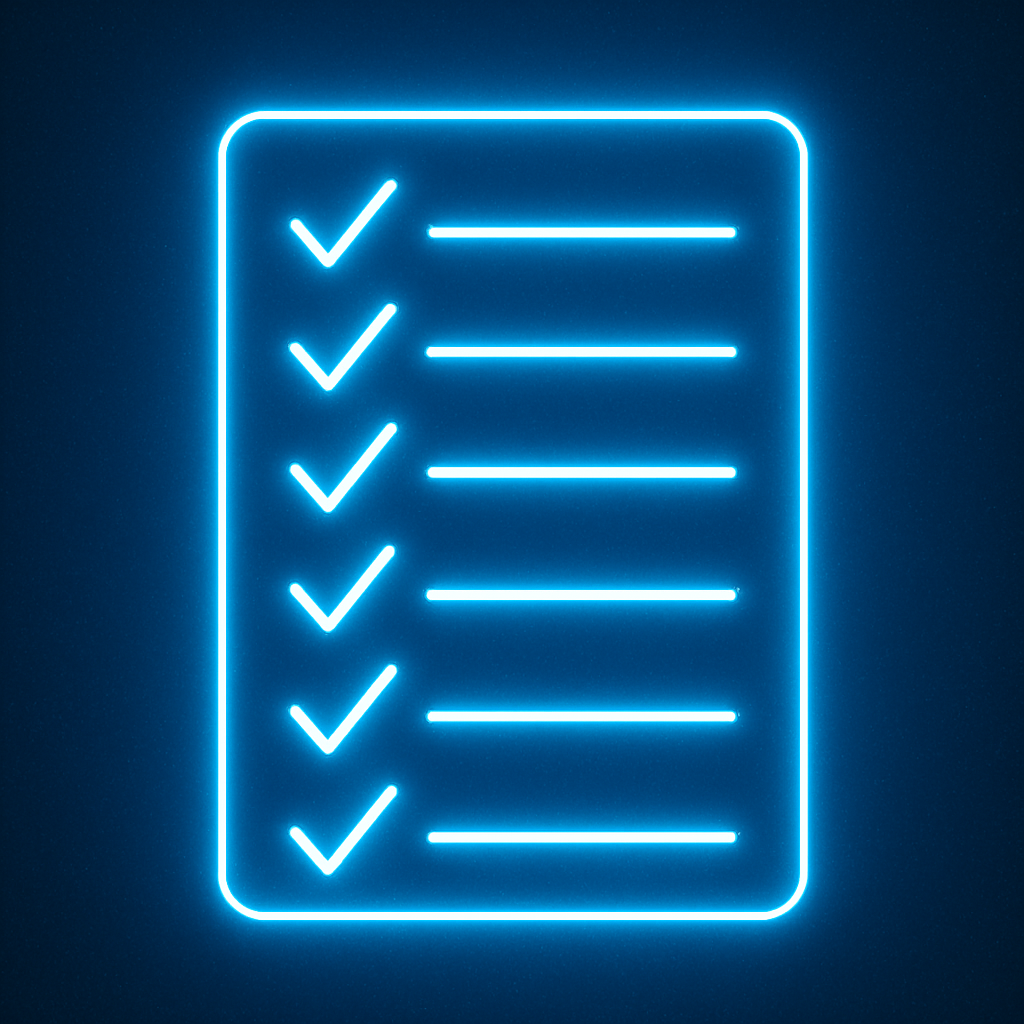A real estate compliance checklist is no longer optional — it’s the safety net that protects your brokerage from risk, fines, and lost trust.
Most brokers don’t worry too much about compliance until something goes wrong. It’s usually not a dramatic headline moment — it’s something small: a missing initial, an earnest money deposit that was never confirmed, a disclosure form that didn’t make it into the file. And yet, these small details can have massive consequences.
- A $5,000 fine from your state regulator.
- A deal delayed because the title company won’t release funds.
- An angry client who feels something shady happened.
- Worst case? Risking your license — the foundation of your business.
The truth is, most brokerages are juggling 20, 30, even 50 active transactions at a time. In that environment, relying on sticky notes, email chains, and memory is a recipe for disaster. That’s where a real estate compliance checklist comes in.
But not just any checklist. A smart one. A living system that doesn’t just keep you organized — it actively protects your brokerage.
Table of Contents
Why Compliance Matters More Than Ever
Ten years ago, compliance felt simpler. Files were thinner, and audits were less aggressive. Fast forward to today, and the landscape has shifted.
- State regulators are stricter – Audits are more frequent, and penalties are harsher. Arizona’s Department of Real Estate, for example, now expects electronic audit trails showing who reviewed which documents and when.
- E&O insurance claims are rising – Missing disclosures or mishandled funds can lead to claims that push premiums higher.
- Broker liability is increasing – Courts have repeatedly found that “I didn’t know” isn’t a defense. Brokers are responsible for their agents’ files, period.
If you’re running a brokerage with 5 agents or 50, you’re not just managing salespeople — you’re managing legal exposure. And the cost of getting compliance wrong has never been higher. Even NAR has dedicated resources to guide brokers on risk management.
What a Real Estate Compliance Checklist Actually Does
At its core, a compliance checklist is more than a to-do list. Done right, it:
- Protects your brokerage from legal risk – every item is proof that you upheld your duty as a broker.
- Ensures every transaction meets state and brokerage-specific requirements – not just the basics, but the nuances your local market demands.
- Keeps agents on track without constant handholding – agents know what’s required, reducing the “where’s this form?” questions.
- Gives transaction coordinators and brokers a shared system to review files – so nothing slips through the cracks.
Think of it as both your safety net and your audit defense binder.
What’s Usually Missing in Broker Checklists
Here’s where most brokerages stumble: their checklists look neat on paper, but they miss the details that actually matter in an audit.
- ❌ Missing initials or signatures on key forms
- ❌ Incomplete or missing disclosures (lead-based paint, wire fraud notices, SPDS)
- ❌ Addenda that never get uploaded after verbal agreements
- ❌ No timestamps showing when broker review happened
- ❌ No verification of earnest money receipt from escrow
- ❌ No confirmation for ACH/wire transfer instructions
Each of these is a real-world failure point. Regulators and auditors don’t care if the deal closed — they care if the file can prove compliance. Industry experts at Inman note that even experienced brokerages often miss small compliance details — like unsigned addenda or unverified deposits — that can later trigger major issues during audits.

Real Estate Compliance Checklist: Sample Items
A strong checklist should cover the entire lifecycle of a deal. Here’s a breakdown of what to include:
Listing Stage
- ☑ Listing agreement signed by all owners
- ☑ Seller property disclosures (SPDS, CLUE, etc.)
- ☑ MLS input form and accuracy verification
- ☑ Lead-based paint disclosure (if applicable)
Offer & Contract Stage
- ☑ Fully executed purchase contract (with all signatures/initials)
- ☑ Buyer agency disclosure and confirmation
- ☑ Counteroffers and addenda uploaded
- ☑ Wire fraud disclosure acknowledged
Funds & Escrow Stage
- ☑ Proof of earnest deposit (copy of check, escrow receipt)
- ☑ Verification of ACH/wire instructions provided to client
- ☑ Settlement statement reviewed and signed
Commission & Closing Stage
- ☑ Commission instructions or CDA (Commission Disbursement Authorization)
- ☑ Broker review approval form with timestamp
- ☑ Final real estate compliance checklist signed off
DIY Compliance Checklist vs. Compliance Software
Most brokerages start with Excel or Google Sheets. It works — for a while. But once you have multiple agents, dozens of active deals, and audits looming, the cracks show.
| DIY Checklist (Spreadsheets/Manual) | Compliance Software (Like My Broker Cloud) |
|---|---|
| Relies on humans to remember uploads | Upload reminders built in |
| No timestamps for reviews | Automatic audit trails |
| Agents forget steps, files get messy | Agents can’t progress until required docs complete |
| Broker reviews are time-consuming | AI highlights missing signatures/docs |
| Zero visibility across all files | Dashboard view for all transactions |
Bottom line: A spreadsheet tracks tasks. A compliance software protects your license.
What to Look for in a Real Estate Compliance Tool
If you’re evaluating platforms, look for features that move beyond simple task lists:
- ✅ Built-in, customizable checklists (state + brokerage-specific)
- ✅ Progress gates (block closing until required docs uploaded)
- ✅ Time-stamped broker review logs
- ✅ Agent-level vs. broker-only permissions
- ✅ Easy “at a glance” dashboard for every transaction
- ✅ Bonus: AI-powered checks that flag errors before review
That last one is the game-changer. As Forbes points out, compliance isn’t just paperwork — it’s the foundation of trust and sustainability in any regulated industry, including real estate.
How We Solved It with My Broker Cloud
I’ve been in the industry long enough to know this: even with systems in place, compliance usually falls on one person’s shoulders. A broker or TC has to open every file, scroll through every PDF, and catch every missing initial.
That’s exhausting. And risky.
I always thought: Why can’t the system help with that? Why can’t it highlight what’s missing before it ever hits my desk?
That’s exactly why we built AI Compliance Assist into My Broker Cloud.
- 🔎 Flags missing documents or initials automatically
- 📝 Prompts agents before they submit incomplete files
- 📊 Gives brokers a review-ready summary (fewer surprises)
- ⏱ Cuts review time in half — while improving accuracy
The result? Faster closings. Fewer fines. Way less stress.
FAQs About Real Estate Compliance
What happens if my brokerage fails a compliance audit?
Depending on your state, you could face fines ranging from $500 to $25,000 — plus possible license suspension.
How often should real estate compliance checklists be updated?
At least once a year, or any time your state association releases new forms or disclosure requirements.
Can AI really review contracts?
Yes — AI can’t replace broker judgment, but it can flag missing initials, unsigned pages, or incomplete disclosures with impressive accuracy.
Do small brokerages really need compliance software?
Yes. In fact, smaller brokerages often have less margin for error since the broker is personally named on every deal.
Final Thoughts
A strong real estate compliance checklist is the foundation. But in 2025, pairing that checklist with smart automation is the only way to truly protect your time, your business, and your license.
Don’t wait until a regulator shows up or a deal falls apart. Build your checklist, then let My Broker Cloud’s AI do the heavy lifting. Because the cost of one missed detail is simply too high to risk.
Why I Built My Broker Cloud (Personal Note)
I’ve always been passionate about making things more efficient — whether it was in city government, running operations, or managing hundreds of transactions. But I kept running into the same problem: systems didn’t talk to each other, and compliance was always an afterthought.
I wanted something different. A platform where:
- Brokers could sleep at night knowing files were solid.
- Agents had clarity without endless back-and-forth.
- Clients trusted the process because it was transparent.
That’s why I created My Broker Cloud. Not just another transaction system — but a compliance safety net that helps brokerages scale without risking what matters most: your license.

